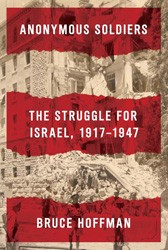On the eve of the Six-Day War in June 1967, the Israeli government had reconciled itself to the partition of the land between Jews and Arabs, and to the fixed borders arrived at by the 1948 armistice. Indeed, as Gorenberg notes in his riveting account of the birth of the West Bank and Gaza settlements following the Six-Day War, David Ben-Gurion, Israel’s prime minister during the war for Israel’s independence in 1948, understood that “tying ourselves up in hostile Arab territory would have imposed on us an unbearable choice, accepting hundreds of thousands of Arabs among us, or mass expulsion…” Anticipating an ideological argument that would divide the Jewish state in decades to come, Ben-Gurion wanted a state with a Jewish majority more than he wanted the entire homeland.
The Six-Day War that resulted in Israel’s conquest of the West Bank and Gaza was not a conflict with predetermined objectives. Prime Minister Levi Eshkol’s government had no greater ambition than to defend the country, negotiate peace talks with the Arabs, and restore the armistice lines of 1948. Indeed, all of the major political factions in Israel, including Menachem Begin’s Herut Party, had reconciled themselves to the permanency of the Green Line that separated Israel from Arab territory. The war dramatically altered the situation for both sides.
Following the war, the Arab countries, unwilling to accept their defeat, met in Khartoum and rejected any contact with Israel. Thus Israel unwillingly found itself administrating territories with more than a million Palestinians under its military control, unprepared with any long-term policy for the occupation. The suddenness of acquiring this “accidental empire,” however, also unleashed a religious fervor in those who saw, in the conquest of the historic homeland and the unification of Jerusalem, the fulfillment of biblical prophecy and the onset of the Messianic age. So was born the settlement movement, beginning with religious yeshiva students led by Rabbi Moshe Levinger, who created a presence in Kfar Etzion, Hebron. As one rabbi explained the emergence of the Whole Land of Israel Movement, “God has shown us the way to redeem the Jewish nation.” One religiously- inspired follower prayed that “this settlement will be forever,” and another asserted that “we have removed the shame of the term administrated territories, and returned to the true fitting term, ‘redeemed territories.’”
Gorenberg dismisses the belief that the Eshkol government was reluctantly pushed by Orthodox settlers to reestablish Kfar Etzion. Rather, states Gorenberg, Eshkol made a choice and imposed his decision on the cabinet, “misrepresenting his intentions abroad. From this point, he personally directed settlement in occupied territory.” Once the first settlement was founded, both Eshkol and his successors gave tacit consent to others that followed, some of which were founded amidst heavily populated Arab areas. The Arabs, however, indirectly helped this process by refusing to negotiate with Israel, thus creating a void in the status of the territories which the settlers commenced to fill by creating “facts on the ground.” Thus, states Gorenberg, Israel backed into colonialism in the occupied territories. Colonialism, concludes Gorenberg, “like the conquest itself, reflected a vacuum of strategy. It was born of a national evasion of choices.”





